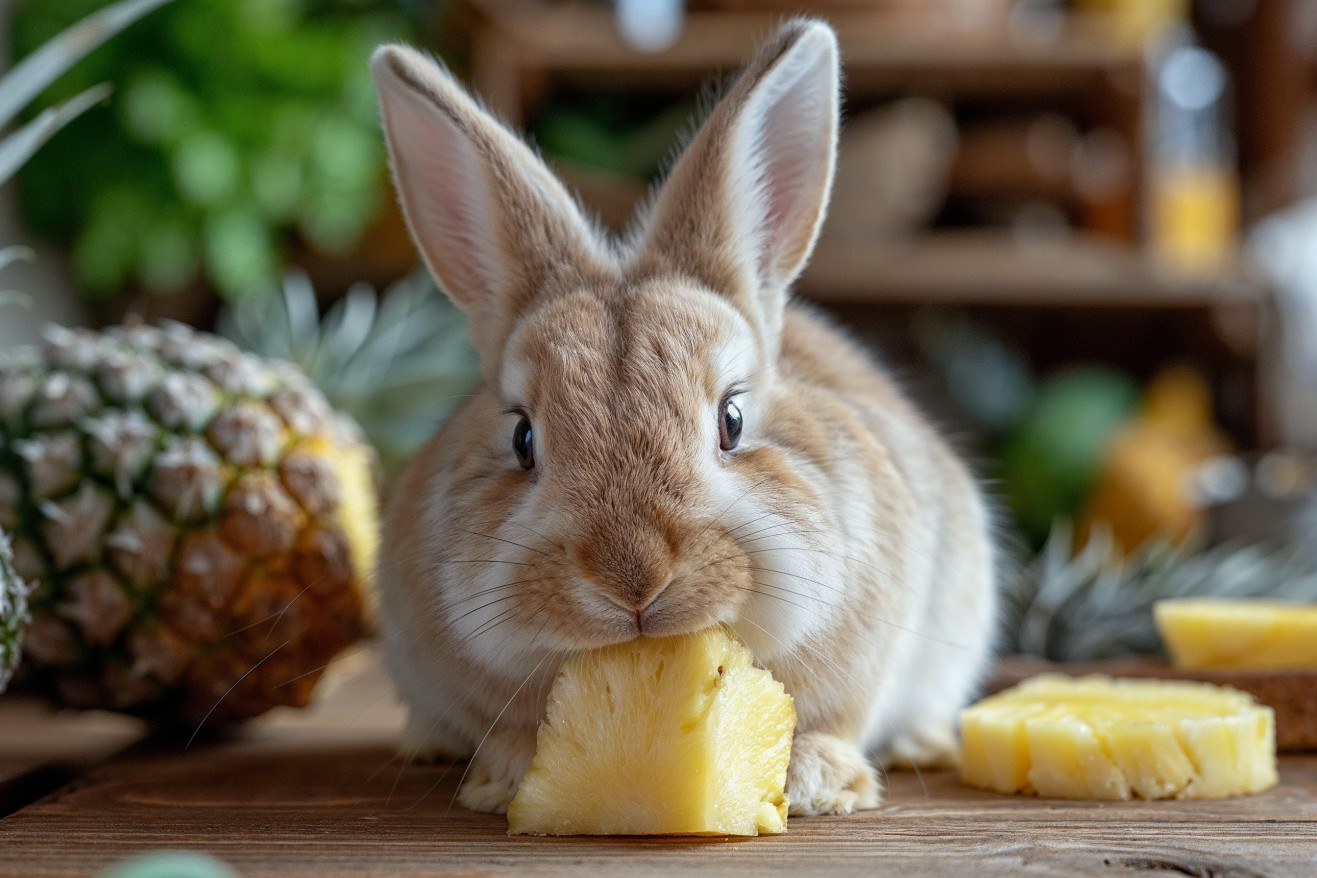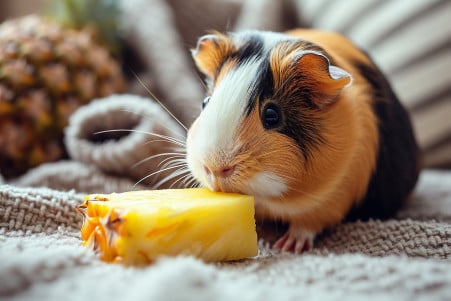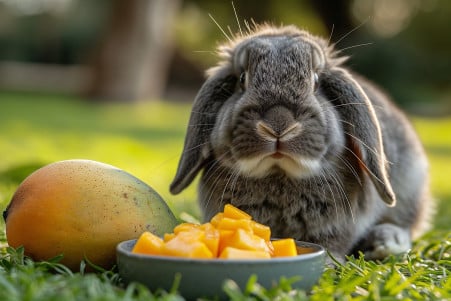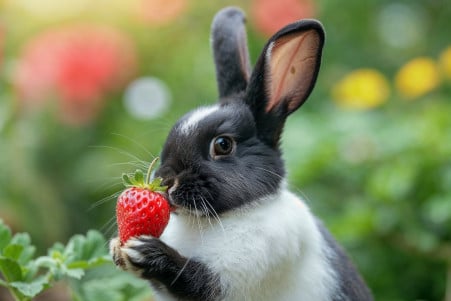Can Rabbits Eat Pineapple? A Guide to Safe Snacking
25 January 2024 • Updated 28 January 2024

Pineapple is a delicious and sweet fruit that you may want to share with your rabbit, but is it safe or should you steer clear? Rabbits can eat pineapple in moderation as an occasional snack. However, because it is high in sugar, pineapple should be fed in small amounts to prevent potential health problems, such as digestive disturbances. Make sure to take off the skin and core, and don’t feed your rabbit canned pineapple.
This article will explore the nuances of rabbit nutrition, with input from veterinarians and animal nutrition research. We’ll cover the nutrients that rabbits need to consume, the role of sugar in their diet, and where pineapple falls in these categories. We’ll also look at the most recent research in small animal medicine and talk to professionals to find out how to responsibly include fruits like pineapple in your rabbit’s diet.
Can rabbits eat pineapple safely as part of their diet?
How to Make Sure Your Rabbit Has a Healthy Diet
Rabbits need certain nutrients to stay healthy and thrive. The Merck Veterinary Manual explains that a rabbit’s diet should be high in long particle length fiber, which is important for maintaining gastrointestinal motility. Timothy hay is often recommended because it has about 15% crude fiber, which is good for the digestive system and can help reduce the risk of intestinal disease.
Rabbits also need vitamins A, D, and E, with vitamin A needs ranging from 5,000 to 75,000 IU/kg to prevent reproductive problems.
Water is also an important part of a rabbit’s diet. The RSPCA explains that rabbits should always have access to fresh, clean water and will typically drink about 120 mL/kg/day. This is important for their complex digestive system and can help prevent dehydration, which can lead to other health problems.
That said, it’s also important to make sure that a rabbit’s diet is balanced. For example, some foods, especially those that are high in carbohydrates, can lead to obesity or hypercalciuria, which can be caused by the fact that some pelleted diets are too nutrient-dense if they’re not fed in the right amounts.
While pineapple is nutritious, it’s also high in sugar, so it should only be fed in small amounts to avoid health problems. This overview sets the stage for a deeper dive into the impact of sugar on rabbits, which will make it clear why it’s important to feed them treats like pineapple in moderation to ensure their health.
How Sugar Fits into Rabbit Diets
Rabbits have a very specific digestive system that is designed to process fibrous plant material, not sugar. As hind-gut fermenters, rabbits depend on a specific balance of gut bacteria to ferment fibrous material in the cecum, according to Purina Animal Nutrition.
When rabbits eat sugar, it is absorbed in the small intestine, which can potentially throw off this balance of bacteria. Vetstreet explains that this can lead to issues like gastrointestinal stasis, which is when the digestive system slows down or stops working altogether.
While sugar and starches are naturally occurring in many plants and are not inherently bad, it’s important to use them in moderation to avoid health problems. In her research on rabbit nutrition, Frances Harcourt-Brown explains that sugar and starches are not dangerous but should be limited to avoid obesity and imbalanced diets.
Rabbit owners can feed pineapple, which is high in natural sugars, as a treat in small, controlled amounts to avoid the problems associated with overeating. By understanding these distinctions, rabbit owners can make sure that treats like pineapple are safe indulgences rather than dangerous to their pets.
How to Choose the Best Treats for Your Rabbit
The most important thing to look for in rabbit treats is low sugar and high fiber. As Medivet explains, treats should be fed in addition to a rabbit’s main diet, which is made up of hay and leafy greens.
While pineapple can be a fun treat, it’s important to consider the sugar content in comparison to other treats that are often recommended, like Oxbow’s baked hay treats or Small Pet Select’s dried fruits and herb blends.
Treats can also be useful for training and monitoring your rabbit’s health. Paying attention to how your rabbit reacts to treats can help you notice changes in their behavior or appetite that could be a sign of a health problem. As Bunny Lady recommends, the amount of treats you give your rabbit should be limited to about 1–2 tablespoons of fruit per day, depending on the rabbit’s size and how active they are.
To make sure your rabbit’s diet stays balanced, make sure to introduce treats like pineapple slowly and in small amounts so they don’t take the place of the fibrous parts of your rabbit’s diet that they need to stay healthy. If you stick to these rules, you can make sure you’re giving treats in a way that’s safe for your rabbit.
Wild Roots: What Rabbits Eat in the Wild
The wild rabbit’s diet is a perfect example of how evolution has shaped an animal to be an herbivore. As explained in Rabbits Life, wild rabbits are selective feeders that eat a wide range of plant-based foods that shift with the seasons, from tree bark and twigs in the winter to fresh green plants and dry grasses in the spring and summer.
This selective diet allows them to eat the most nutritious parts of plants while also getting the fiber they need to keep their complex digestive systems healthy. In addition, wild rabbits eat cecotropes, a form of coprophagy, to ensure they get the most nutrients from their food, a practice that’s especially important during the winter when food is scarce.
The inclusion of non-native foods like pineapple in the diet of domestic rabbits is a clear departure from the wild rabbit’s natural diet.
While domestic rabbits may enjoy the taste of fruit, it’s not a regular part of the wild rabbit’s diet, according to Live Science.
As a result, rabbit owners should be careful when feeding these foods to their pets, especially since there may be long-term health consequences to straying from the diet their bodies are evolutionarily adapted to. By sticking to the blueprint, rabbit owners can ensure they’re feeding their pets a diet that’s in line with their natural tendencies, which can help support their health and well-being.
In Conclusion: Can Rabbits Eat Pineapple?
In conclusion, rabbits can eat pineapple, but it is important to follow the guidelines that will keep them safe and healthy. Pineapple should be given to rabbits as a treat and in moderation because of its high sugar content, and canned pineapple should be avoided because it contains added sugars and preservatives. The skin and core of the pineapple should be removed to avoid choking and digestive hazards.
This article has stressed the importance of a rabbit’s diet, including the need for high fiber, the importance of vitamins, and the need for hydration. Pineapple and other treats should not replace these dietary necessities. Moderation is the key, and the frequency and amount of treats like pineapple should be adjusted to avoid health issues like obesity and gastrointestinal stasis.
By responsibly adding treats like pineapple to your rabbit’s diet, you are showing that you care about their health. By finding the right balance and preparing treats with care, you can add to your rabbit’s diet in a way that will help them stay happy and healthy. Once again, the key to happy, healthy bunnies is moderation and care.


